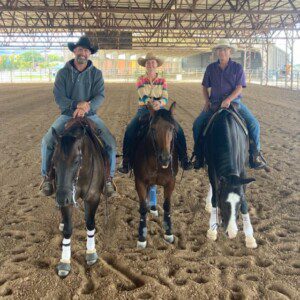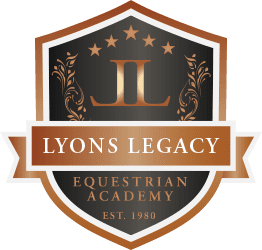Troy Chappell and April Scarbrough are classmates in Josh Lyons’ accreditation program. But that’s not all they have in common.
Both have had successful careers in the past – Troy as a farmer in North Dakota, April as an active duty Marine – and both now hope to start a new career training horses and helping others in the process.
“I’ve downsized and I figured I’d retire and do something I enjoy,” Troy said. “As a farmer I had horses and I’ve done tons and tons of trail riding but as I age I want to do more than just ride – I want to teach.”
Troy, 59, said he’s helped people in the past, privately, but never as a business. That’s what he wants to change with Lyons’ help.
“This program is just the best,” he said. “Josh makes you feel like family – there’s no pressure. He really helps you tune in to what you want to do.”
One technique that sticks with him is a technique that helps the horse – and rider – let go of unwanted stress. He describes taking the horse in slow, small circles and then slowly increasing speed and moving in bigger circles.
“It raises their emotions up and down … it helps to control the horse’s emotions,” he said. “There are tons of exercises to control parts of the horse’s body – it’s kind of complex, but we break it down and put it together.
“I’m just here to better myself,” Troy said. “A horse is never really finished, and as a horseman, you never stop learning – it’s kind of a lifelong thing.”
The accreditation program is a four-week, hands on course. Trainers learn to control every aspect of a horse’s performance. The program offers targeted training techniques aimed at training higher level horses and riders.
These students say the program is about the horse, but it’s about the trainer too. They say no horseman – or horse woman – is the same – you take what works for you and leave the rest.
April retired from the marines a over a year ago. At 43, she hopes to become an equine therapeutic riding instructor.
“I looked at the qualifications for an equine therapeutic riding instructor and I realized my riding was lacking,” she said. “My brother had horses and I rode as a little girl – trail rides and wagons. As an adult I tried barrel racing and also practiced dressage. But I knew I wanted to learn more.”
She knew early on the Lyons program was different.
“I’ve learned more in two weeks than I did in all the years before,” she said. “There are definitely differing skill levels, but there’s no judgement here. I’m the least experienced but it’s no big deal.”
April wants to team up with a non-profit to help treat women suffering from trauma, specifically military sexual trauma, which refers to experiences of sexual assault or sexual harassment that a Veteran experiences during military service.
“The VA has counseling and therapy but no specific activity to get them off the couch and out of their heads.”
She also pointed to the Lyons organizations use of the GI Bill® Benefits as another factor that drew her to the Lyons program.
These benefits help qualified veterans pay for college, graduate school or training programs.
“I’ve been very grateful for that,” she said.

Lyons Legacy
28209 139th Street
Scottsdale, AZ 85262
Monday – Friday
9 AM – 4 PM EST
Saturday
1 PM – 3 PM EST
© Copyright 2022 Lyons Legacy Equestrian Academy | Produced by Global Media Design